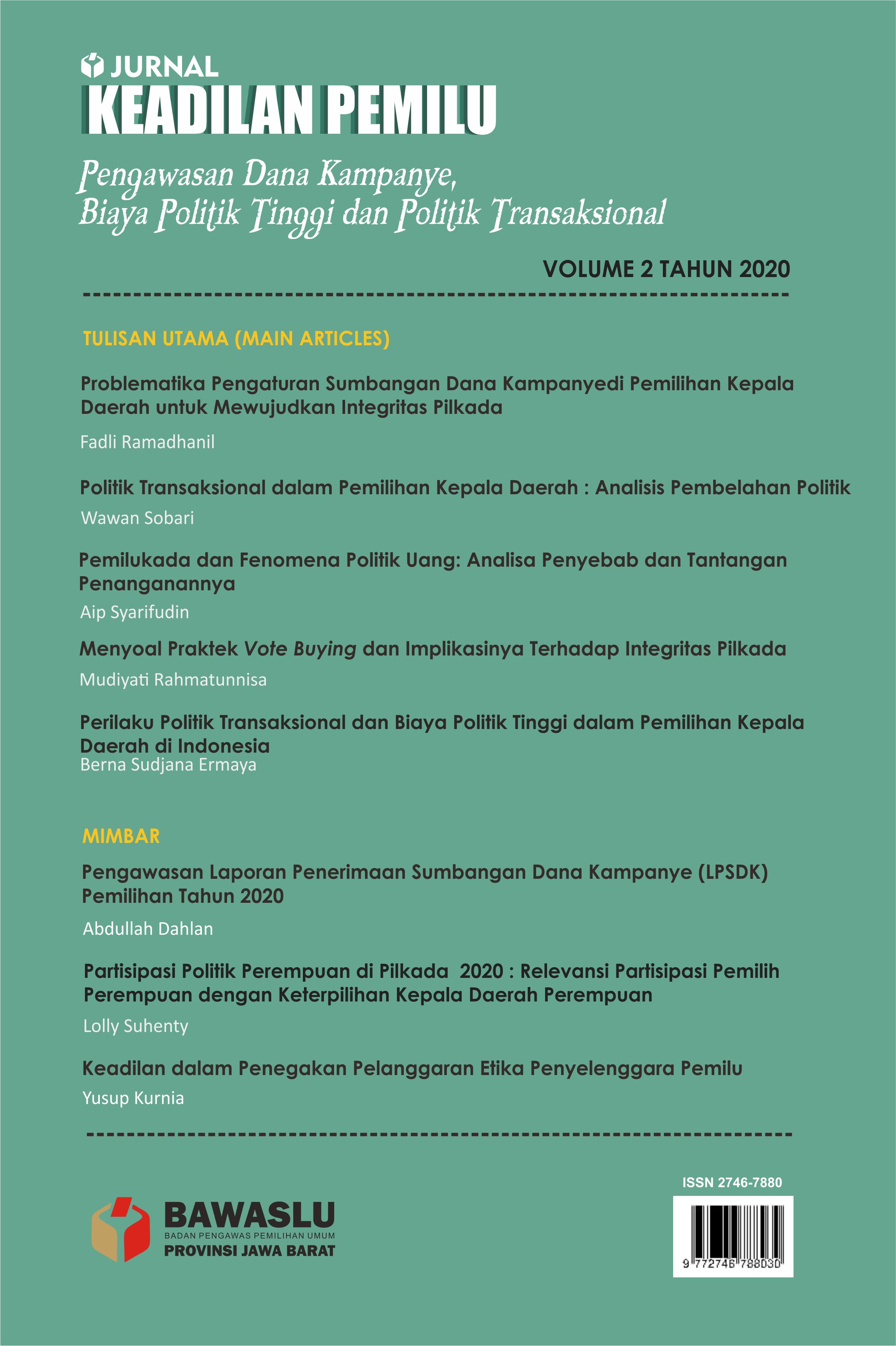MENYOAL PRAKTEK VOTE BUYING DAN IMPLIKASINYA TERHADAP INTEGRITAS PEMILU
DOI:
https://doi.org/10.55108/jkp.v1i2.170Kata Kunci:
vote buying, pemilu berintegritas, demokrasi, pemiluAbstrak
Praktek vote buying merupakan salah satu bentuk pelanggaran utama yang kerap terjadi dalam proses elektoral. Artikel ini mendiskusikan kompleksitas pemaknaan konsep, bentuk dan penyebab terjadinya vote buying. Selain itu, mendiskusikan pula bagaimana pengaruh vote buying terhadap perwujudan pemilu yang berintegritas dan strategi apa yang dapat dilakukan untuk meminimalisir praktek vote buying. Dengan menggunakan penelusuran literatur kontemporer dan relevan, vote buying merupakan konsep yang illusive dan dimaknai beragam. Praktek ini berpotensi marak terjadi dengan berbagai bentuknya ketika proses elektoral berkelindan dengan kemiskinan, rendahnya tingkat pendidikan, dan low level of political attitudes. Praktek vote buying secara signifikan mendistorsi prinsip kebebasan, keadilan dan kompetisi dari pemilu berintegritas. Meski sulit untuk sama sekali dihilangkan, upaya meminimalisir prevalensi vote buying dapat ditujukan baik kepada vote buyers dan juga vote sellers.
Referensi
Alemika, E. E. (2007) Quality of Elections, Satisfaction with Democracy and Political Trust in Africa. Nigeria. Available at: www.afrobarometer.org. (Accessed: 31 December 2020).
Aspinall, E. and Sukmajati, M. (2015) ‘Patronase dan Klientelisme dalam Politik Elektoral di Indonesia’, in Aspinall, E. and Sukmajati, M. (eds) Politik Uang di Indonesia: Patronase dan Klientelisme pada Pemilu Legislatif 2014. Yogyakarta: Penerbit PolGov, pp. 1–49.
Birck, S. and Muchlinski, D. (2018) ‘Electoral Violence: Patterns and Trends’, in Garnett, H. . and Zavadskaya, M. (eds) Electoral Integrity and Political Regimes. New York: Routledge.
Brusco, V., Nazareno, M. and Stokes, S. C. (2004) ‘Vote buying in Argentina’, Latin American Research Review, 39(2), pp. 66–88. doi: 10.1353/lar.2004.0022.
Callahan, W. A. (2005) ‘Social Capital and Corruption: Vote Buying and the Politics of Reform in Thailand’, Perspectives on Politics, 3(03), pp. 495–508. doi: 10.1017/S1537592705050310.
Carreras, M. and Irepoglu, Y. (2013) ‘Trust in elections, vote buying, and turnout in Latin America’, Electoral Studies, 32, pp. 609–619. doi: 10.1016/j.electstud.2013.07.012.
Dekel, E., Jackson, M. O. and Wolinsky, A. (2008) ‘Vote buying: General elections’, Journal of Political Economy, 116(2), pp. 351–380. doi: 10.1086/587624.
Fortin-Rittberger, J., Harfst, P. and Dingler, S. C. (2017) ‘The costs of electoral fraud: establishing the link between electoral integrity, winning an election, and satisfaction with democracy’, Journal of Elections, Public Opinion and Parties, 27(3), pp. 350–368. doi: 10.1080/17457289.2017.1310111.
Fox, J. (1994) ‘The Difficult Transition from Clientelism to Citizenship: Lessons from Mexico’, World Politics, 46(2), pp. 151–184. doi: 10.2307/2950671.
van Ham, C. (2015) ‘Getting elections right? Measuring electoral integrity’, Democratization, 22(4), pp. 714–737. doi: 10.1080/13510347.2013.877447.
Hasen, R. L. (2000) ‘Vote Buying’, California Law Review, 88(5), pp. 1323–1324. doi: 10.2307/3481262.
Jensen, P. and Justesen, M. (2014) ‘Poverty and vote buying: Survey-based evidence from Africa’, Electoral Studies, 33, pp. 220–232. doi: 10.1016/j.electstud.2013.07.020.
Kitschelt, H. (2007) ‘The demise of clientelism in affluent capitalist democracies’, in Kitschelt, H. and Wilkinson, S. I. (eds) Patrons, Clients, and Policies. Cambridge: Cambridge University Press, pp. 298–321.
Kurniawan, R. C. et al. (2017) ‘Vote Buying In Lampung Local Election’, MIMBAR, Jurnal Sosial dan Pembangunan, 33(2), p. 359. doi: 10.29313/mimbar.v33i2.2664.
Lehoucq, F. (2003) ‘Electoral Fraud : Causes, Types, and Consequences’, Annual Review of Political Science, 6(1), pp. 233–256. doi: 10.1146/annurev.polisci.6.121901.085655.
Lehoucq, F. E. and Molina, I. (2002) Stuffing the Ballot Box: Fraud, Electoral Reform, and Democratization in Costa Rica. New York: Cambridge University Press.
Levin, I. and Alvarez, R. M. (2012) ‘Introduction to the Virtual Issue: Election Fraud and Electoral Integrity’, Political Analysis, 20(V4), pp. 1–7. doi: 10.1017/s1047198700014297.
Lindberg, S. and Ham, C. (2015) ‘Vote Buying Is A Good Sign: Alternate Tactics of Fraud in Africa 1986-2012’, V-Dem Institute Working Paper Series, 2015. doi: 10.2139/ssrn.2613854.
Morgan, J. and Várdy, F. (2012) ‘Negative Vote Buying and the Secret Ballot’, Journal of Law Economics and Organization, 28, pp. 818–849. doi: 10.2139/ssrn.1706490.
Muhtadi, B. (2019) ‘The Determinants of Vote Buying: The Profile of Typical Vote “Sellers” BT - Vote Buying in Indonesia: The Mechanics of Electoral Bribery’, in Muhtadi, B. (ed.). Singapore: Springer Singapore, pp. 81–107. doi: 10.1007/978-981-13-6779-3_3.
Munck, G. L. and Verkuilen, J. (2002) ‘Conceptualizing and Measuring Democracy’, Comparative Political Studies, 35(1), pp. 5–34. doi: 10.1177/001041400203500101.
Nichter, S. (2008) ‘Vote buying or turnout buying? Machine politics and the secret ballot’, American Political Science Review, 102(1), pp. 19–31. doi: 10.1017/S0003055408080106.
Nichter, S. (2014) ‘Conceptualizing vote buying’, Electoral Studies, 35, pp. 315–327. doi: 10.1016/j.electstud.2014.02.008.
Rahmatunnisa, M. (2017) ‘Mengapa integritas pemilu penting?’, Jurnal Bawaslu, 3(1), pp. 1–11. Available at: http://www.bawaslu.go.id/sites/default/files/publikasi/01 JURNAL BAWASLU.pdf.
Schaffer, F. C. (2002) ‘What is Vote Buying?’, “Trading Political Rights: The Comparative Politics of Vote Buying,” International Conference, Center for International Studies, MIT, Cambridge. Cambridge: MIT. Available at: http://www.gsdrc.org/docs/open/po14.pdf (Accessed: 22 November 2020).
Schaffer, F. C. (2007) ‘Why Study Vote Buying?’, in Elections for Sale: The Causes and Consequences of Vote Buying. Boulder, CO: Lynne Reinner Pub, pp. 1–16.
Stokes, S. C. (2013) ‘Political Clientelism’, in Goodin, R. E. (ed.) The Oxford Handbook of Political Science. Oxford: Oxford University Press. doi: 10.1093/oxfordhb/9780199604456.013.0031.
Vicente, P. and Beck, C. (2014) Is vote-buying always bad for development? - IGC. Available at: https://www.theigc.org/blog/is-vote-buying-always-bad-for-development/ (Accessed: 4 December 2020).
Vicente, P. C. and Wantchekon, L. (2009) ‘Clientelism and vote buying: Lessons from field experiments in African elections’, Oxford Review of Economic Policy, pp. 292–305. doi: 10.1093/oxrep/grp018.
Unduhan
Diterbitkan
Cara Mengutip
Terbitan
Bagian
Lisensi
Hak Cipta (c) 2020 Mudiyati Rahmatunnisa

Artikel ini berlisensi Creative Commons Attribution 4.0 International License.




